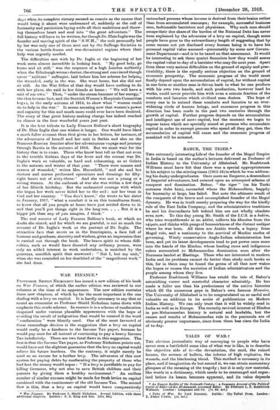BABUR, THE TIGER.*
Tias extremely interesting Life of the founder of the Mogul Empire in India is based on the author's lectures delivered as Professor of Indian History to the University of Allahabad. Mr. Rushbrook Williams must have felt that there was a special appropriateness in his subject to the stirring times (1915-16)in which he was address- ing his dusky undergraduates. Once more an Emperor, a descendant of Imperial adventurers, had entered upon an attempted scheme of conquest and domination. Babur, "the tiger" (as his Turki surname dubs him), succeeded where the Hohenzollern, happily for humanity at large, has failed. But note the ultimate result of the conquests of the brave and accomplished founder of the Mogul dynasty. He was in truth merely preparing the way for the kindly rule of the East India Company, and the administrative traditions he and his descendants left behind him are not wholly obsolete even now. To this day young Mr. Smith of the I.C.S. is a hakim, who tries ntuqaddamahs in an (ideal, collects his khazdna from the riiyats, and thinks with pangs of homesickness of the distant waidyat where he was born. All thetas are Arabic words, a legacy from Mogul rule, and a testimony to the survival of Muslim modes of governing. Wisely conservative Anglo-Indian administration has been, and yet its latest developments tend to put power once more into the hands of the Hindus, whose leading races and indigenous rulers succumbed ,to Mohammedan domination soon after the Normans landed at Hastings. Those who are interested in modern India and its problems cannot do better than study such books as this, for in them may be found the germs of all that now wakes the hopes or rouses the anxieties of Indian administrators and the people among whom they live.
Professor Rushbrook Williams has retold the tale of Babur'e astonishing career and masterful character admirably. He has made a fuller use than his predecessors of the native histories which fill the numerous gaps in Babur's own famous Memoirs, The University of Allahabad is to be congratulated on so useful and valuable an addition to its series of publications on Modern Indian History. We can only trust that it will be widely read in India as well as in Europe. The recently revived interest of Hindus in pre-Mohammedan history is natural and laudable, but the causes and results of Mohammedan rule in the peninsula are of obviously greater importance, since from them has risen the India of to-day.


























 Previous page
Previous page